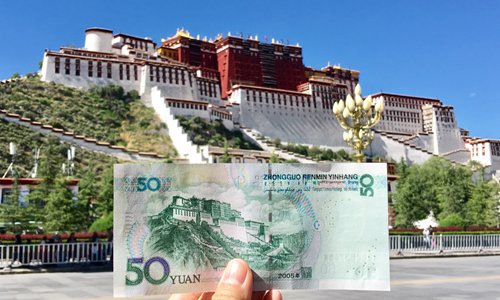
The Potala Palace in Lhasa, capital of Southwest China's Tibet Autonomous Region (Photo: Li Jingjing/GT)
Tibet can be rewarding, but needs preparation
Southwest China's Tibet Autonomous Region is on the list of traveling destinations for many people. Thanks to the region's many portrayals in movies and good word of mouth among travelers, Tibet is seen as a holy and mysterious land that most people want to visit at least once in their lifetime.
While I agree that Tibet is definitely a must-see place, most people don't consider the difficulties that ensue with such a pilgrimage.
People who are looking to go on a fun, relaxed and exciting holiday, probably should head somewhere else.
Traveling in Tibet definitely will be exhausting as the physical challenges this place presents makes it difficult to relax.
However, don't think I'm trying to intimidate those who are yearning to visit Tibet. I just feel that being fully prepared both physically and mentally is crucial to really enjoying everything this place has to offer.
I just finished my first trip to Tibet in late July, and here I would like to share some of my personal experiences, as well as some tips.
What to take
"Travel light" does not apply to Tibet. On the contrary, it's better to pack as much as possible. Several things are essential for traveling in Tibet.
1. Altitude sickness medicine
It's important for every one who is not accustomed to high altitudes to pack medicine to treat this sickness, because it could happen to anyone at different levels of severity.
Tibet is known as the "roof of the world." The average altitude is more than 4,000 meters above sea level and most scenic spots are located at places nearly 5,000 meters above sea level. That means the available oxygen in the air is almost 40 percent less than what we normally breathe.
This can cause a series of symptoms, including headache, loss of appetite, trouble sleeping and fast heartbeat - all of which could stop you from enjoying your trip.
Taking medicine to prevent high altitude sickness every day in Tibet is necessary, while some medicine needs to be taken several days before landing in Tibet, especially for those who have never been on the plateau.
While it was my first time being on plateau, I didn't suffer from altitude sickness my first day. I give half of the credit to all the medicine I kept taking every day.
In China, there are two main medicines that most people choose, medicine made from herba rhodiolae, the other is lan yang pian, or blue pills, each of which enhance your body's ability to absorb oxygen. They are all available on taobao.com.
Cold medicine is also something you need to bring, because the changing -temperature in Tibet can -easily cause a cold, which could become a fatal sickness at high altitude.
2. Clothes for four seasons
The temperature can be dramatically different from one place to another in Tibet, or simply just from day to night. It's very common to wear a short-sleeve T-shirt during the day and then wear a down coat at night.
This is why Tibetans tend to wear their cotton--padded jackets with one sleeve on their shoulder and the other off.
If you are heading for mountains and lakes, packing down coats and pants, as well as climbing boots are important.
Although in summer, places like Lhasa are warm enough to just wear a short-sleeve shirt, but it's better to wear a thin jacket, because the sunshine is very strong and could give you a terrible sunburn. Packing sunblock and bringing sunglasses is essential.


















































